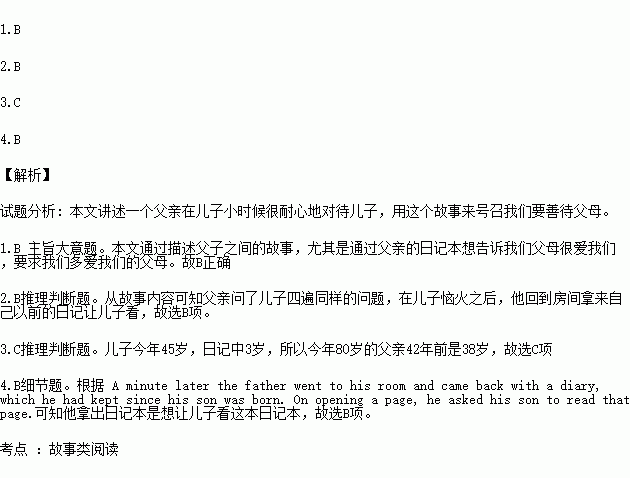题目内容
An 80-year-old man was sitting on the sofa in his house along with his 45-year-old son. Suddenly a crow(乌鸦) landed on their window.
The father asked his son, “What is that?”
The son replied, “That is a crow.”
After a few minutes, the father asked his son for the second time, “What is that?”
The son said, “Father, I told you just now. It is a crow.”
After a little while, the father asked his son the same question for the third time, “What is this?”
This time his son shouted at his father, “Why do you keep asking me the same question again and again? I have told you already. ‘IT IS A CROW.’ Are you not able to understand this?”
A minute later the father went to his room and came back with a diary, which he had kept since his son was born. On opening a page, he asked his son to read that page:
Today my little son aged three was sitting with me on the sofa, when a crow suddenly landed on the window edge. My son asked me 23 times what it was, and I replied him 23 times that it was a crow. I hugged him lovingly each time he asked me the same question. I did not at all feel angry, but instead felt affection for my son.
If you parents reach old age, do not look at them as a burden, but speak to them gently, and be kind to them. From today say this aloud, “I want to see my parents happy forever. They have cared for me ever since I was a little child. They have always showered me with love. I will take care of my old parents in the BEST way no matter how they behave.”
1.The writer mainly intends to ______.
A. tell us the function of a diary
B. call on us to love our parents
C. teach us what a crow is
D. introduce a pair of son and father
2.According to the passage, the son felt _____ when his father kept asking the same question.
A. puzzled B. angry C. grateful D. surprised
3.We can know that the father wrote this diary at the age of ______.
A. eighty B. forty-give
C. thirty-eight D. thirty-five
4.The old man brought out the diary, which he had kept since his son was born, because ___.
A. he forgot what had happened
B. he would like his son to read it
C. it could remind himself of the past
D. he wanted to find what a crow was in his diary

